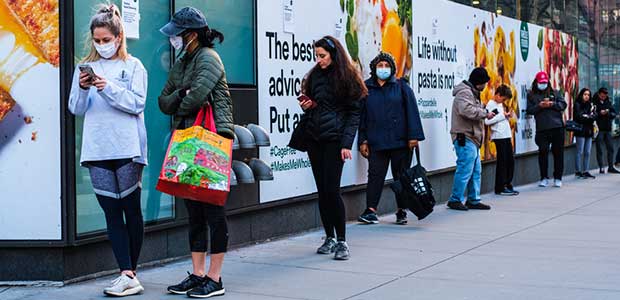
Experts Say Americans' Commitment to Masks Could Get Virus Under Control in Two Months
Many states are now enforcing mandatory mask orders to combat rising coronavirus cases across the nation. Mounting evidence suggests masks significantly reduce the transmission of the virus, and experts from the CDC say good mask wearing could mean improvement in two months.
The CDC, World Health Organization and U.S. government officials say wearing masks is one of the best ways to slow the spread of the coronavirus. The United States could get the coronavirus under control in one to two months if every American wore a mask, top officials at the CDC said, according to one news article.
“The time is now,” Dr. Robert Redfield, director of the CDC, said during an interview with the Journal of the American Medical Association’s Dr. Howard Bauchner. “I think if we could get everybody to wear a mask right now I think in four, six, eight weeks we could bring this epidemic under control.”
Not all states have issued mandatory mask-wearing, and many that are seeing case surges are leaving that choice up to local cities and counties. One recent New York Times article provides readers with an interactive map to see where people are wearing masks—and where they are not. The accompanying map shows the odds of whether, if you encountered five people in a given area, all of them would be wearing masks.
In some parts of America, you see nearly everyone wearing a mask. In other parts, there are almost no masks in sight. While most cities have employees wearing masks in restaurants and retail stores, many other areas of the country do not require their workers to wear masks.
The reasons for these differences are many, but the rifts in behavior have to do with political climates and where case counts are flaring up. Beyond the political climate and case count in each area, though, there is another factor that encourages or discourages mask-wearing: peer actions. Persuasion matters, and friends and family follow suit with what their close friends and family do.
“We definitely take our cues from our friends, and we often, almost always, already share values with our friends,” Professor Dorrance Hall said. “It takes a strong person to stand up and say: This is what we’re doing and we’re all doing it.”
While scientists are still studying how exactly the virus is transmitted, scientists agree that the virus spreads through respiratory droplets (and has a chance of being transmitted through aerosols in the air—particularly in indoor spaces).
Scientists have urged Americans to wear masks for months, but the CDC just recently released a new study that said state leaders should consider requiring face coverings to reduce the spread of the virus.
U.S. Surgeon General Jerome Adams also recommends Americans everywhere use face coverings in public—but he agrees mask education is needed with those mandates. He voiced his concern about the state of the U.S. and the extreme need for mask-wearing but says education on why masks work and slow the spread would be beneficial.
“I am saying if we are going to have a mask mandate we need to understand that works best at the local and state level along with education. We need people to understand why they are doing it and we need people to understand how they benefit from it,” Adams said.
He continued, “As surgeon general, I want people to understand why they should wear a face covering and they are going to be more likely to do it and more likely to do it willingly and they're going to be more likely to do it when we are not watching which is important.”
Adams recently tweeted a video of himself dancing and encouraging mask wearing with young kids:
The U.S. government has still not provided required coronavirus risk-steps for different workplaces, but OSHA has released a number of recommended guidances for various workplaces. Read OSHA’s Guidance on Preparing Workplaces for COVID-19.